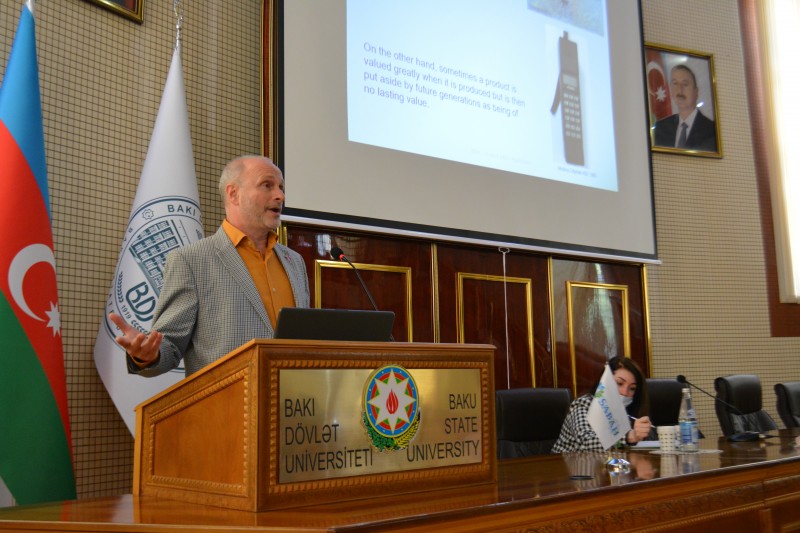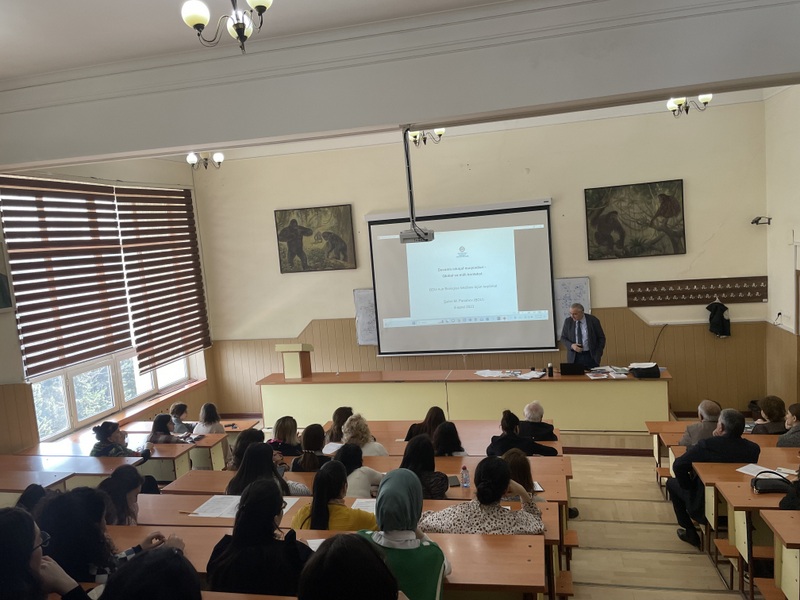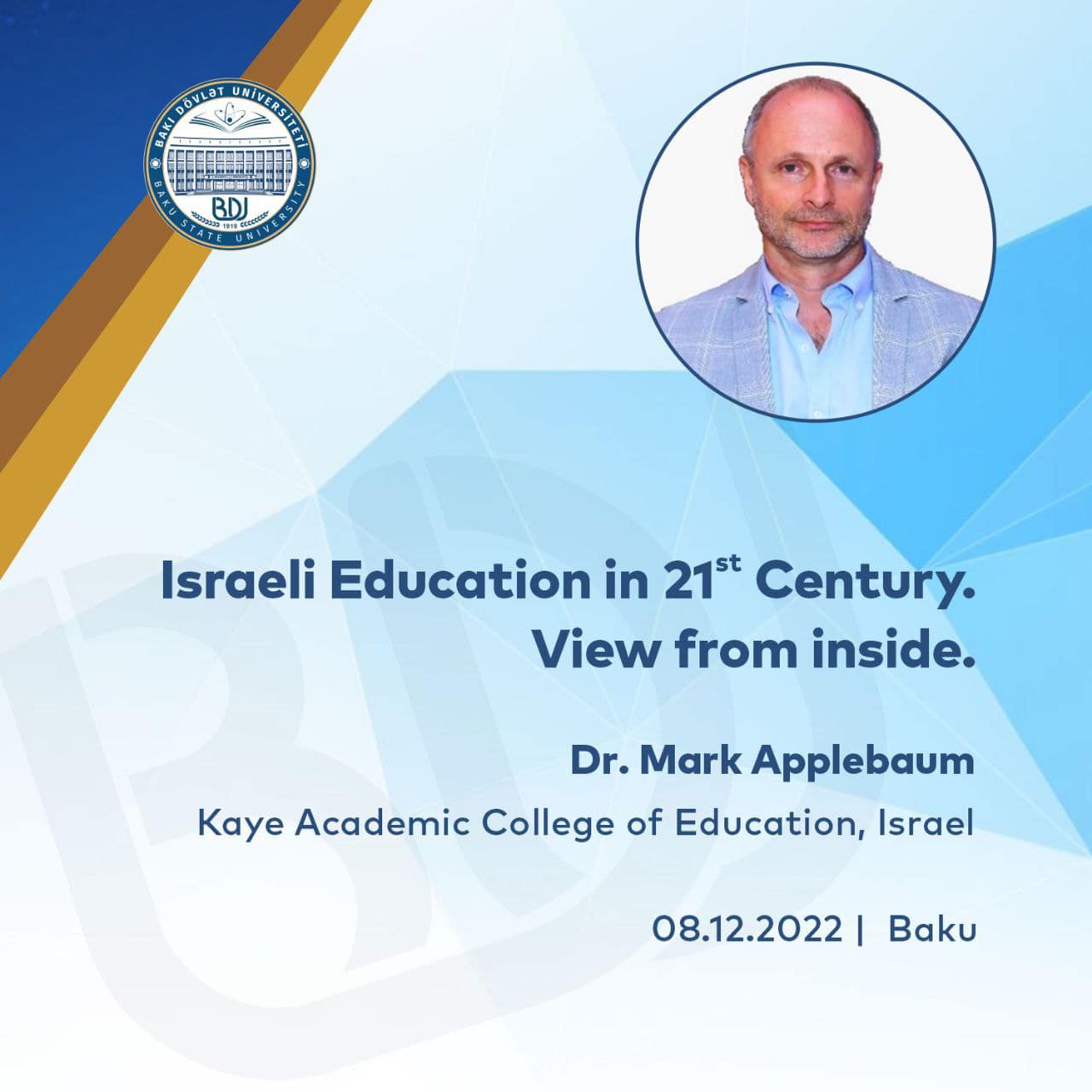.png) The SDGs are currently the focus of a number of structured trainings or educational programs at BSU. Parallel to this, various SDG-related subjects, such "Introduction to Gender," "Sustainable Development Goals in Azerbaijan," "Green" and "Blue" Economy," "Food Security and Sustainable Development," "Urbanization and Urban Planning," etc., are covered in the pertinent academic programs.
The SDGs are currently the focus of a number of structured trainings or educational programs at BSU. Parallel to this, various SDG-related subjects, such "Introduction to Gender," "Sustainable Development Goals in Azerbaijan," "Green" and "Blue" Economy," "Food Security and Sustainable Development," "Urbanization and Urban Planning," etc., are covered in the pertinent academic programs.
Beginning with the 2019–2020 academic year, Baku State University will offer a bachelor's degree program in "Sustainable Development Management". As previously mentioned, specific themes on particular SDG areas are also included in the various study programs. Examples include "Introduction to Gender," "Azerbaijan's Sustainable Development Goals," "The Green and Blue Economy," "Food Security and Sustainable Development," "Urbanization and Urban Planning," and others.
The faculty of ecology is involved in the Baku-Tbilisi-Kars environmental monitoring project, the master's in ecology training project under the TEMPUS program, and the ETL project on "Ecological Monitoring" under the organization of the department's "ANSF and MTRF".
At department meetings and meetings in the Department of Environmental Chemistry, topics pertaining to scientific methodology and education are frequently discussed. Discussions of scientific seminars, courses, and diploma theses are occasionally necessary.
Research Centre with a specific focus on environmental sustainability
In Azerbaijan, the development of plants is slowed down by a variety of environmental stressors. In turn, this causes plants' productivity to decline. Cotton farming is a key component of initiatives aiming at the advancement of the agrarian sector. One of the crucial concerns is improving the resistance of cotton grown in the Republic of Azerbaijan to diseases as well as to other stressors. The Faculty of Biology and Bioengineering ETL's research focuses on phytohormone-assisted cotton development (VOL. 7/No. 3 of Advances in Biology and Earth Sciences, available online at jomardpublishing.com/journals.aspx?lang=en&id=3&menu=8).
In this area, some progress has already been made. Studies are currently being done to determine how novel phytohormone derivatives affect the immunological resistance of various cotton genotypes.
http://bsu.edu.az/az/content/altaac_tdristcrb_mrkzi
http://bsu.edu.az/az/content/quba_tdristcrb_v_istiraht_mrkzi.
University outreach projects (education, health, information services, reading, community engagement, tutorials) for the local community
Baku State University as a whole participates in educational outreach activities (such as customized lectures, demonstrations, workshops, etc.) both on and off campus, for instance: at neighborhood schools, in the community, and through independent student-run projects. Student Youth Organizations, Student Scientific Societies, Student Trade Union Committees, and other groups all play crucial roles in this regard. For the growth and enlightenment of society, they organize a number of events and seminars on important and enlightening subjects.
United Nations/Azerbaijan Workshop on the International Space Weather Initiative: The Sun, Space Weather and Geosphere was jointly organized by the United Nations Office for Outer Space Affairs and
the Baku State University with the support of the International Committee on Global Navigation Satellite Systems (ICG) 31 October - 4 November 2022.
The main objectives of this workshop are to continue efforts in the deployment of instruments in developing nations and interpretation of space weather data; to focus on new research results and findings; and at the same time aim at strengthening international coordination and cooperation on space weather products and services.
The expected outcomes of the workshop will be recommendations for improved collection, exchange and delivery of space weather data, as well as improved operational analysis, modelling and forecasting methods through the promotion of best practices, suggestions of means to improve accuracy, reliability and interoperability.
The discussions at the Workshop will also be linked to the 2030 Agenda for Sustainable Development and to its targets set out for Sustainable Development Goals (SDG). The workshop will contribute to:
SDG 4: Quality Education: Continuation of the efforts in space weather education in order to better define and characterize severe space weather events and their probability of occurrence and assess their impacts on technological systems.
SDG 9: Industry, Innovation and Infrastructure: In the area of protecting infrastructure from space weather. Effects on the ground can include damage and disruption to power distribution networks, increased pipeline corrosion, and degradation of radio communications.
SDG 17: Partnerships for the Goals: International coordination of operational space weather services, including monitoring, forecasting.
The observations and recommendations emanating from the workshop will be disseminated in form of report of the Committee on the Peaceful Uses of Outer Space (COPUOS) to the United Nations General Assembly.
https://www.unoosa.org/oosa/en/ourwork/psa/schedule/2022/2022-iswi-workshop.html
https://www.unoosa.org/oosa/en/ourwork/psa/schedule/2022/2022-iswi-workshop.html
 |
 |
 |
.jpg) |
 |
